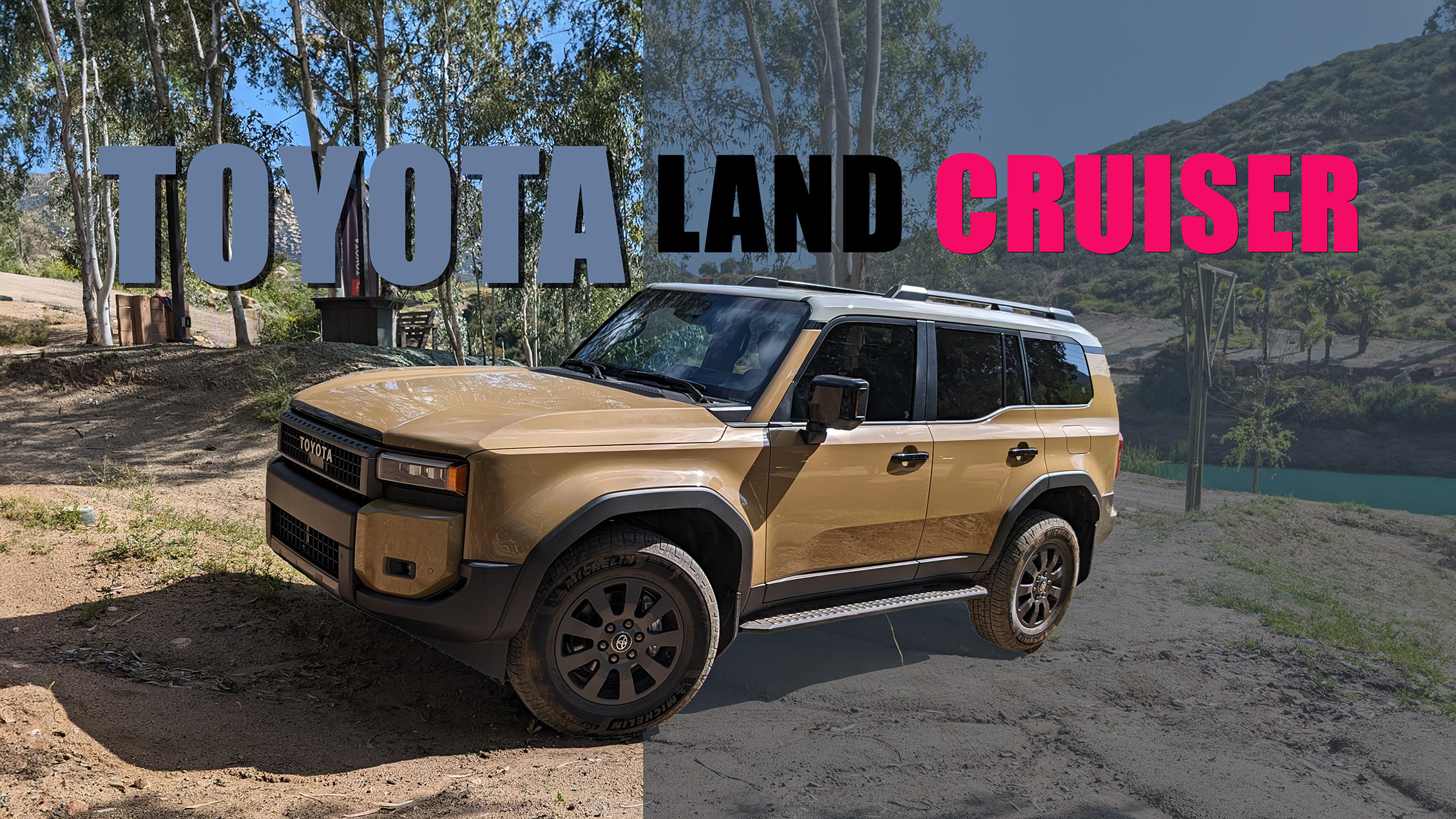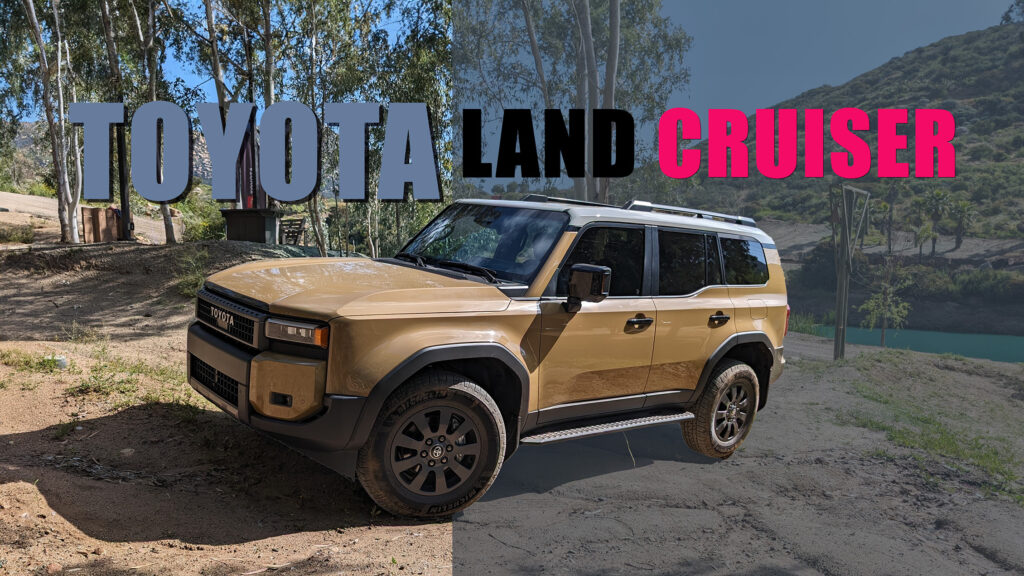
If the i-Force MAX engine proves reliable this will easily go down as the best Land Cruiser to date
5 hours ago
The Land Cruiser nameplate is akin to Toyota royalty. It’s been around in one form or another for over 70 years so when it went out of production for North America after 2021, it was big news. Now, the re-introduction of the model to the U.S. market as part of an entirely new generation is even bigger news.
Toyota has completely revamped the model in just about every way possible. It looks totally different, it uses a new drivetrain including a new hybrid engine, and it has a much lower starting price than the previous generation. Those factors have all garnered worthwhile interest but none of it will matter if the Land Cruiser is little more than a shell of its former self.
First Look: New Toyota 4Runner Trailhunter Is A Turn-Key Overlanding Machine
To find out just how much old-school capability this all-new SUV still has we traveled to California where Toyota let us take it way off-road for as long as we wanted. What we found out is that the Land Cruiser fills a gap in the market by blending real off-road performance with a premium interior experience.
Quick Facts
All Aboard The Hybrid Drivetrain
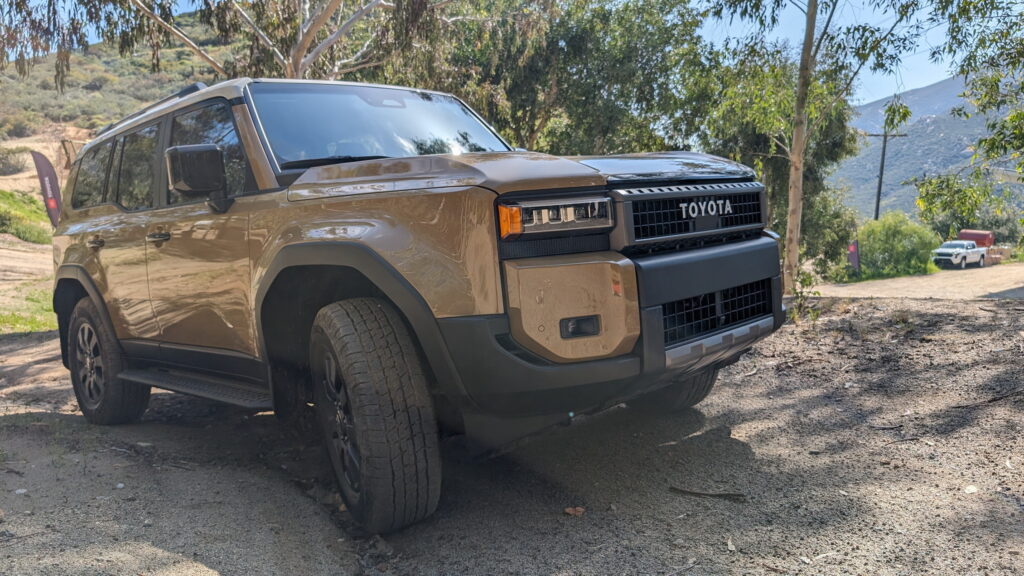
Toyota is leaning heavily on its new 2.4-liter turbocharged hybrid four-cylinder dubbed the i-Force MAX that will be used in every new Land Cruiser regardless of trim or features. Buyers will benefit from 326 hp (243 kW) and 465 lb-ft (629 Nm), an eight-speed automatic transmission and standard full-time four-wheel drive. The front suspension is made up of a double-wishbone architecture while the rear relies on coil springs and outboard-mounted twin-tube shocks.
It also gets a two-speed transfer case, CRAWL control, and locking differentials at the rear and in the center. That’s a serious combination and looks perfectly poised to go head-to-head with vehicles like the Ford Bronco, Jeep Wrangler, and even the Land Rover Defender.
At the same time, it’s not as capable in terms of angles. It has an approach angle of 32 degrees, a departure angle of 22 degrees, and a breakover angle of 23 degrees. Despite that, it’s a bit more off-road focused than the previous Land Cruiser from 2021.
That SUV made 381 hp which is significantly more than the new one but the previous generation had two shortcomings. First, it made just 401 lb-ft of torque, and second, it only managed up to 14 mpg combined. Toyota tells us that this new Land Cruiser will make up to 23 mpg combined. It’ll also tow up to 6,000 pounds (2721 kg). Those stats are a massive step in the right direction both for Toyota and for owner’s wallets at the gas pump.
A Sophisticated And Squared Off Cabin
Keeping with the old versus new theme, the new Land Cruiser’s interior design leans back toward the off-road segment compared to its previous generation. Instead of a more car-like cabin with swoopy design language and super-high-tech features, this new SUV is squared off and a bit more cohesive without losing its luster. There are spaces on every door card and in the center tunnel that call back to the high-end quality the Land Cruiser is known for.
The steering wheel is a great example of all of these points. It’s blocky with a simple but elegant design. The switchgear is completely devoid of touch-sensitive/haptic controls. Instead, these are physical switches and buttons that feel good to use. They provide a delightful tactile feeling and each control set is unique enough that it’s easy to learn without having to constantly look down at the wheel.
That same level of switchgear is present in the center console on all of the climate controls, the off-road controls, and the volume knob. If there’s anything to complain about, it might be that volume knob. It’s placed completely on its own just to the left of the infotainment system. That puts it completely out of reach for the front passenger and at the same time just looks a little strange. Nevertheless, we’re glad to see the plethora of real buttons, switches, and knobs.
Tech For Fun And Safety
The infotainment system itself measures 8 inches in the 1958 Land Cruiser and 12.3 in the other two trims. Both provide above-average feedback and feature an easy-to-use menu layout. Notably, the larger screen is available in the base Land Cruiser for those who prefer it. Frankly, it’s somewhat surprising that the new 14-inch unit from the updated 4Runner doesn’t make an appearance but maybe that’ll happen in the next year or two.
A 7-inch driver information display is standard but the main Land Cruiser trim and the First Edition both get a 12.3-inch digital cluster. Those two upper trim levels also get a multi-terrain monitoring system with selectable front, side, and rear views.
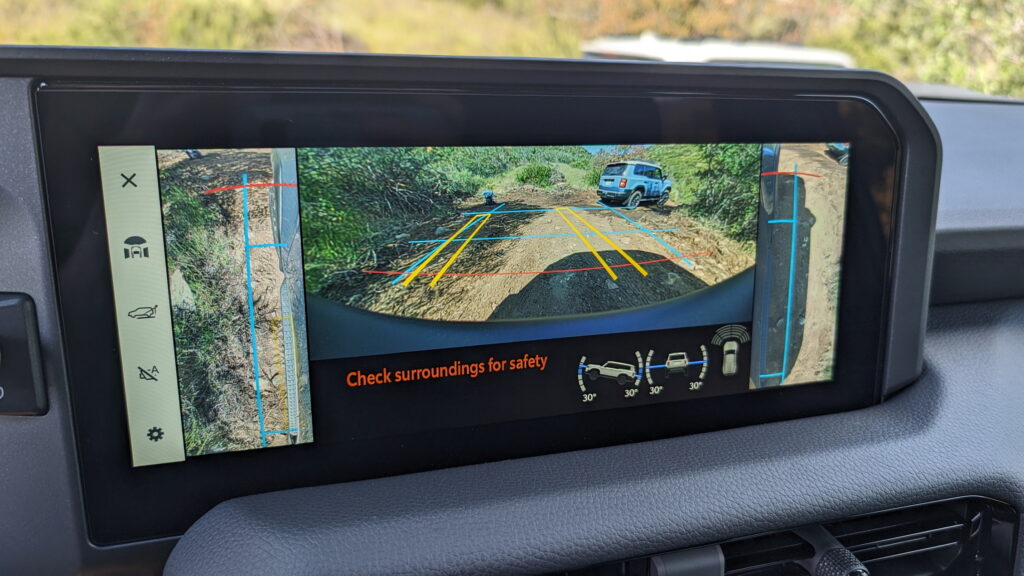
The excellent fit and finish throughout the cabin also nods to previous generations. Tri-zone automatic climate control is standard across the lineup. A cooler option is available for the center console too. The seating is more than ample with excellent head and leg room for adults in both rows.
For now, a third row isn’t available, but the Land Cruiser has cup holders, climate vents, and power ports where a third row would exist. We won’t be shocked if Toyota adds one in the future.
Safety is another area where Toyota can claim to be near the top of the segment. Every Land Cruiser comes with Safety Sense 3.0. It includes lane-tracing assist, road sign assist, automatic high beams, collision mitigation, lane-departure alert, full-speed adaptive cruise control, and proactive driving assist. That’s a big step up on rivals like the Bronco and Wrangler.
Drive Impressions
Toyota limited our driving experience in the Land Cruiser to the place where statistically speaking it’ll be driven the least, namely off-road. While somewhat frustrating, it did give us a chance to test out what makes the Land Cruiser so unique. Blending premium cabin accouterments with serious off-road capability isn’t something that every company gets right. Toyota’s decision to put the off-road controls in prime cabin real estate is a good one.
It makes switching into different modes or engaging an off-road feature, like a locking differential, a breeze. To tackle the more extreme trail Toyota set up for us we had to go into neutral, then switch the Land Cruiser into 4WD Low, then engage the sway-bar disconnect, and decide if you want to use Toyota’s CRAWL control feature.
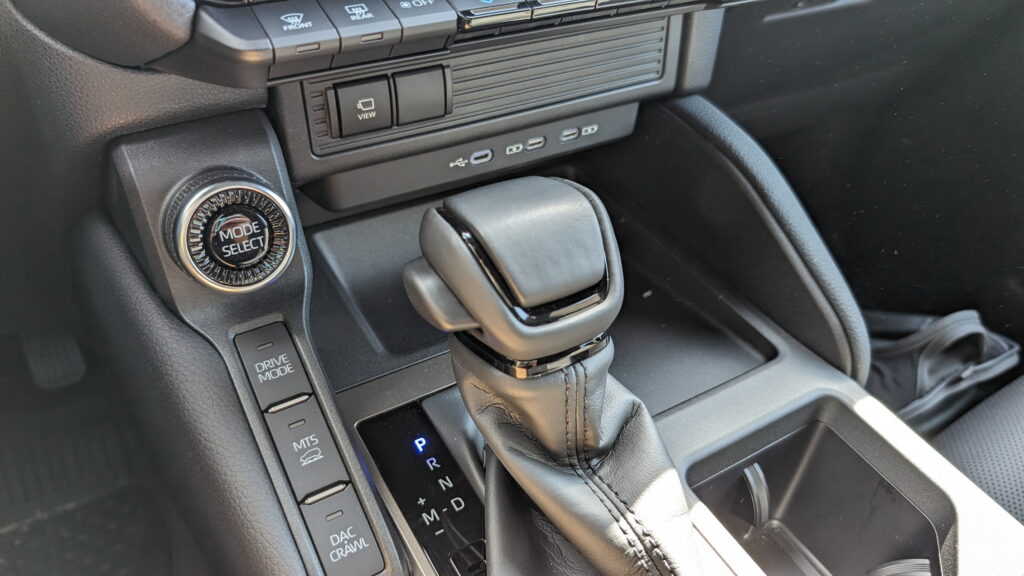
CRAWL control acts as a low-speed off-road cruise control. It has five selectable speeds that can be switched on the go to increase or decrease one’s pace on the trail. It works quite well and is especially helpful on ground that isn’t very consistent. Toyota had us cross several parts of the trail that were full of river rock. It was easy to hear the loose stones moving about under the vehicle but the Land Cruiser had no issue continuing to make forward progress even uphill.
The sway-bar disconnect isn’t the e-KDSS system one will find in other Toyota products but is instead a more simple stabilizer bar disconnect mechanism (SDM) that uncouples the sway bar on command. It’s very handy when maximum articulation is necessary. It combined with the rear differential locker made short work of an obstacle designed to test articulation.
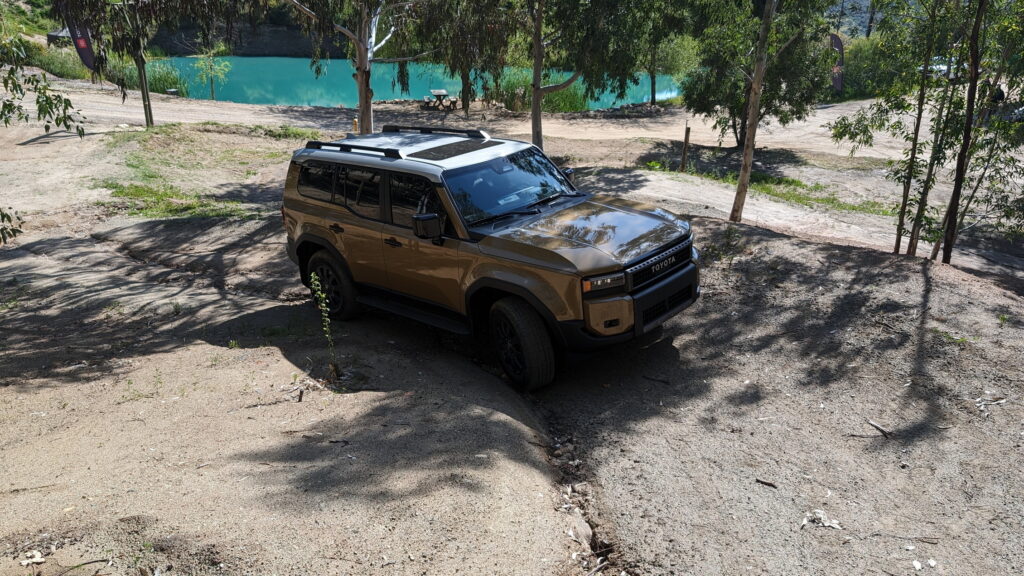
Beyond the physical parts and features that enable the Land Cruiser to go off-road, the technology baked into this SUV makes the experience better too. The camera system is a great addition that goes beyond simply showing the view ahead or behind. Of course, seeing ahead when the horizon is impossible to view from a steep hill is a massive benefit too. On top of that though, the Land Cruiser comes with a great see-through feature that can show exactly where the tires are in relation to the trail.
Once the trail smoothed out we had a chance to feel what the Land Cruiser should almost be like on the road. In a word, it’s serene. Noise, vibration, and harshness from the outside world are largely muffled. Even sharper impacts from the trail are heavily damped by the suspension and chassis. We expect on-road noise to be fairly minimal too thanks to the standard 18-inch all-season tires. Wind noise could be a bit of a bother thanks to the brick-like shape of the Land Cruiser but there is little doubt that it’ll still be quieter than any Bronco or Wrangler out there.
Competition
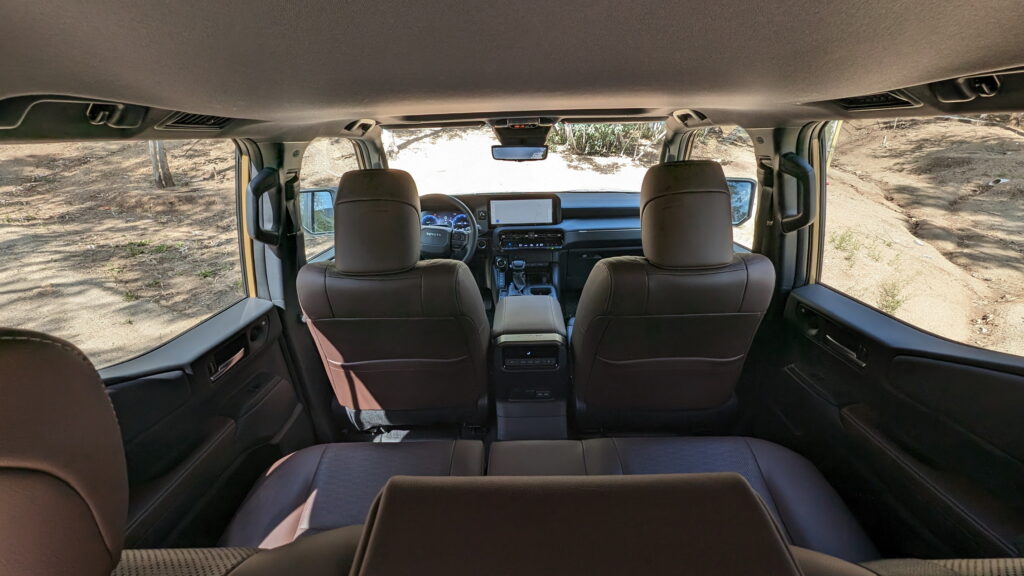
The Land Cruiser is now in a very unique position. No longer is it the high-end luxury SUV from Toyota. Instead, it’s more of a grown-up 4Runner. It’s more refined, it’s more comfortable, and it’s ready to go just about anywhere without modification. That’s largely the same sort of package one gets with a vehicle such as the Land Rover Defender. Of course, the Defender costs more on average, gets worse fuel economy, and its reputation of reliability trails that of the Toyota.
Those in the market for a Wrangler or Bronco might not be as convinced to consider the Land Cruiser though. While it’s very capable off-road it doesn’t boast the same extreme off-road proportions that one can get from Jeep or Ford. Again though, it feels more mature than those SUVs. While we didn’t get the chance to drive it on the road, it shares the same platform as the Tacoma (and 4Runner) which is very good on the pavement. We expect the Land Cruiser to be in the Goldilocks zone of capable SUVs for most buyers. Not as brutal on streets and highways as the Wrangler and Bronco but also not as pricey as a Land Rover.
Final Thoughts
The Land Cruiser made a name for itself by being an incredibly practical and somewhat posh balance of ruggedness, reliability, and refinement. The boxy good looks of this new generation should age well thanks to their simplicity. The tough but somewhat ritzy interior should hold up too. The real determining factor about the legacy of this Land Cruiser generation is going to come down to its drivetrain. If the i-Force MAX proves to be as reliable as Land Cruisers of old, then there’s no question that this will go down as the best to date.
